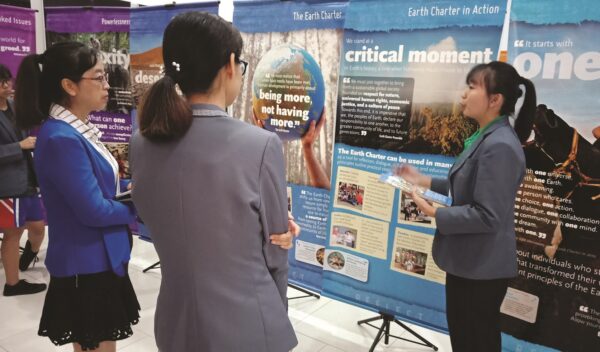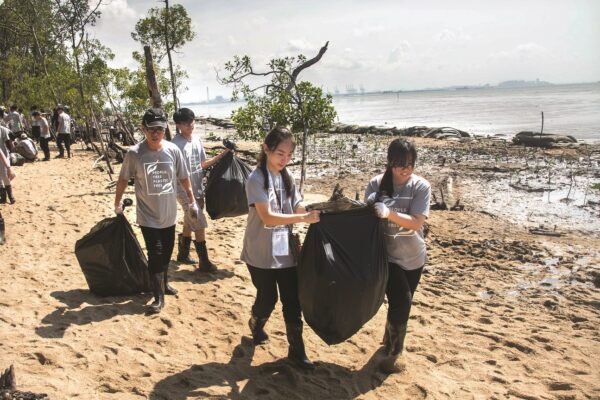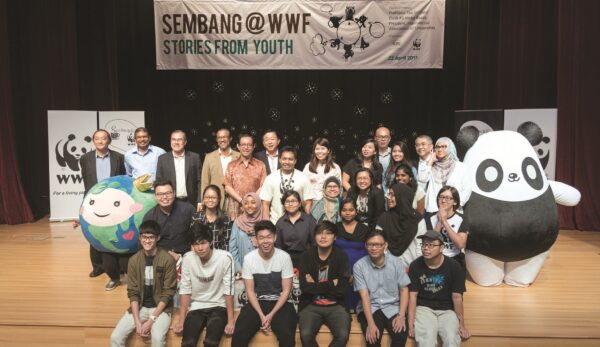Strengthening of and enforcing laws to protect the environment are of course crucial in ensuring we all live in a safe environment. Yet, without a genuine revolution in people’s thinking towards environmental issues and sustainable development, we will find the repeated occurrence of such incidences.
April is the Month of Sustainable Development in SGM. Let’s take a look at the Buddhist perspective on environmental protection and sustainable development.
The SGI Approach to Sustainable Development
How do SGI members approach the topics of environmental protection and sustainable development?

Buddhism stresses three kinds of relationships — those between humans and nature, those between human beings and the relationship with oneself. As practitioners of Nichiren Buddhism, SGI members consider human beings and the environment to be interconnected at the deepest level, inextricably linked and interdependent.
Nichiren Daishonin, the founder of Nichiren Buddhism, wrote: “If the minds of living beings are impure, their land is also impure, but if their minds are pure, so is their land. There are not two lands, pure and impure in themselves. The difference lies solely in the good or evil of our minds.” (WND-1, pg 4) Changing one’s “mind” then becomes the key challenge for Buddhist practitioners.
In the annual SGI Day Peace Proposals and other proposals, environmental themes have been a major focus, starting with a proposal SGI President Daisaku Ikeda authored in 1978. In his paper “The Environmental Problem and Buddhism” published by the Institute of Oriental Philosophy in 1990, he states: “External desertification of the planet corresponds precisely with spiritual desertification of the force of life. Human relations with nature are intimately bound up in interpersonal relations and with the relationship of the self and its inner life. The egoism of human beings whose internal environments are polluted and desolate invariably manifests itself in domination, deprivation and destruction in the external environment.”

President Ikeda has consistently stressed the importance of education and, in particular, education aimed at empowerment. In a proposal authored at the time of the 2002 World Summit on Sustainable Development, he called for the establishment of a UN Decade of Education for Sustainable Development and commented: “In the case of environmental issues, which can be so vast and complex . . . information and knowledge alone can leave people wondering what this all means to them, and without a clear sense of what concrete steps they can take. To counter such feelings of powerlessness and disconnection, education should encourage understanding of the ways that environmental problems intimately connect to our daily lives. Education must also inspire the faith that each of us has both the power and the responsibility to effect positive change on a global scale.” (1)
Ten years later, on the occasion of the United Nations Conference on Sustainable Development, the Rio+20 Conference in 2012, President Ikeda authored another proposal that emphasised that responsible and awakened human beings committed to creating positive value can be the most promising protagonists of change. He also wrote: “Although physical resources are finite, human potential is infinite, as is our capacity to create value. The real significance of sustainability is . . . as a dynamic concept in which there is a striving or competition to generate positive value and share it with the world and with the future.” (2)
President Ikeda has also published dialogues with renowned experts on sustainable development such as Ernst Ulrich von Weizsäcker (titled Knowing Our Worth: Conversations on Energy and Sustainability) and Hazel Henderson (Planetary Citizenship: Your Values, Beliefs and Actions Can Shape a Sustainable World), in which they discussed key environmental and developmental issues confronting humanity and how to overcome them.
SGM’s Activities in Promoting Sustainable Development

In line with the ideals of President Ikeda and the SGI to foster people who are committed to the wellbeing of the environment, SGM has held various activities to promote education on sustainable development and bring people together for this cause. One key platform is the “Seeds of Hope” (SoH) exhibition. SoH stresses our interconnectedness with the rest of the community of life and the need to broaden our sphere of compassion and concern. It encourages viewers to overcome feelings of powerlessness and highlights the fact that a single individual can initiate positive change. It also introduces the positive vision for sustainable living expressed in the Earth Charter, and gives examples of eight individuals and groups who have successfully taken action for change, from Africa to the Arctic and Eastern Europe. Since 2010 till now, SoH has been held nationwide at 250 venues, and has successfully attracted 196, 000 visitors. SoH in particular has been held in many schools and universities nationwide and has played an important role in educating the younger generation on sustainable development.
From 2023 onwards, SGM will continue to promote Education for Sustainable Development through an updated version of the SoH exhibition. This new exhibition titled Seeds of Hope and Action – Making the SDGs a Reality was created by SGI and Earth Charter International. It introduces a positive vision for sustainable living that can contribute to the realisation of the Sustainable Development Goals (SDGs).
Other activities include an activity at the Tanjung Piai National Park in Johor held in April 2018, where SGM members worked hand-in-hand with the Pontian District Office, Johor National Parks Corporation and Universiti Teknologi Malaysia to clean up plastics and plant trees; and the Sembang@WWF jointly-organised by SGM and the World Wildlife Fund for Nature Malaysia (WWF-Malaysia).

Sembang@WWF is a groundbreaking platform for youths to speak and share their ideas on environmental issues and activities to a larger audience through storytelling. At the Sembang@WWF held in Wisma Kebudayaan SGM in April 2017, six young conservation heroes spoke passionately on various topics from poverty, illegal wildlife trade, sun bear conservation, to an app that promotes sustainable actions and projects through picture and video sharing.
During this event, the Malaysia launch of the Mapting app was also held. The app was developed jointly by Soka Gakkai International (SGI) and Earth Charter International (ECI) as a way of engaging and educating youth in the challenge of making the 17 Sustainable Development Goals (SDGs) a reality by the target date of 2030.
Looking Ahead
There is still much to do to foster a citizenry that prioritises sustainable development. SGM will continue to strive to promote sustainable development by engaging with like-minded partners and encouraging its members to exert efforts in this area as well. After all, as Buddhists, we have the social mission to work for the peace and happiness of all humanity, and creating a healthy, pollution-free natural environment is crucial to this endeavour.
Adapted from April 2019 Cosmic with newly updated information
(1) Please visit https://www.daisakuikeda.org/sub/resources/works/props/ed-sustain2002.html for the full text
(2) Please visit https://www.daisakuikeda.org/sub/resources/works/props/environ-proposal-2012.html for the full text.








